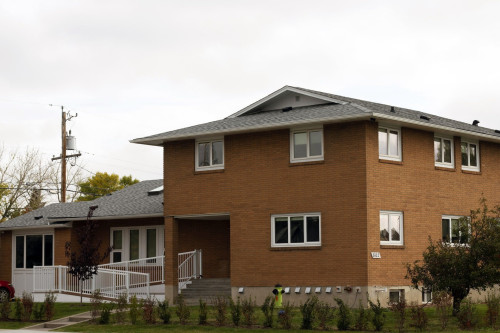





EHN Sandstone Recovery Centre
Treatment Focus
You can get treatment for eating disorders at this center, helping you navigate symptoms, build coping tools, and restore your physical health under expert care.
Primary Level of Care
Offering intensive care with 24/7 monitoring, residential treatment is typically 30 days and can cover multiple levels of care. Length can range from 14 to 90 days typically.
Claimed
Recovery.com has connected directly with this treatment provider to validate the information in their profile.
Treatment Focus
You can get treatment for eating disorders at this center, helping you navigate symptoms, build coping tools, and restore your physical health under expert care.
Primary Level of Care
Offering intensive care with 24/7 monitoring, residential treatment is typically 30 days and can cover multiple levels of care. Length can range from 14 to 90 days typically.
Private Pay
You pay directly for treatment out of pocket. This approach can offer enhanced privacy and flexibility, without involving insurance. Exact costs vary based on program and length of stay. Contact the center for specific details.
EHN Sandstone Recovery Centre
EHN Sandstone Recovery Centre
About EHN Sandstone Recovery Centre
EHN Sandstone Recovery Centre is a CARF-accredited treatment facility that serves adolescents with eating disorders. Sandstone Inpatient Centre provides residential treatment. The program combines evidence-based therapies with a high level of 1-on-1 attention from caring and compassionate clinicians. Clients will engage in cognitive behavior therapy (CBT), dialectical behavior therapy (DBT), meditation, yoga, and more. A typical day includes a healthy and delicious chef-prepared breakfast, followed by time to meditate. Next, clients will engage in physical fitness that can include gym time, walking, or attending a yoga class. After this, clients will attend a psychoeducational lecture to learn about the nature of eating disorders. The afternoon is for individual counseling followed by a delicious dinner. After dinner, clients will attend a group panel before enjoying game night or TV time.
A Private Environment
EHN Sandstone Recovery Centre's intimate setting offers those struggling with eating disorder concerns a safe space for recovery. The Sandstone facility is nestled in a quiet neighborhood in Calgary, Canada. All of their spaces are designed to provide a relaxing, comfortable stay. Clients will enjoy a cozy, home-like environment along with an attentive staff.
EHN's network of treatment centres includes additional locations. Other locations discretely address mental health.
Center Overview
Treatment Focus
You can get treatment for eating disorders at this center, helping you navigate symptoms, build coping tools, and restore your physical health under expert care.

Cash Pay Rates
Estimated Cash Pay Rate
Center pricing can vary based on program and length of stay. Contact the center for more information. Recovery.com strives for price transparency so you can make an informed decision.
Levels of Care



Your Care Options
Specializations
Adolescents
Teens receive the treatment they need for mental health disorders and addiction, with the added support of educational and vocational services.
Eating Disorders
An eating disorder is a long-term pattern of unhealthy behavior relating to food. Most people with eating disorders have a distorted self-image.
Nutrition Counseling
Nutritious food helps patients heal from within, setting them up for mental and bodily wellness as they learn about healthy eating.
Who We Treat
Adolescents
Teens receive the treatment they need for mental health disorders and addiction, with the added support of educational and vocational services.
Young Adults
Emerging adults ages 18-25 receive treatment catered to the unique challenges of early adulthood, like college, risky behaviors, and vocational struggles.
Men and Women
Men and women attend treatment for addiction in a co-ed setting, going to therapy groups together to share experiences, struggles, and successes.
Approaches
Evidence-Based
A combination of scientifically rooted therapies and treatments make up evidence-based care, defined by their measured and proven results.
Family Involvement
Providers involve family in the treatment of their loved one through family therapy, visits, or both–because addiction is a family disease.
Holistic
A non-medicinal, wellness-focused approach that aims to align the mind, body, and spirit for deep and lasting healing.
Individual Treatment
Individual care meets the needs of each patient, using personalized treatment to provide them the most relevant care and greatest chance of success.
Therapies
1-on-1 Counseling
Patient and therapist meet 1-on-1 to work through difficult emotions and behavioral challenges in a personal, private setting.
Mindfulness Therapy
This ancient practice can be mental, emotional, and even spiritual. In meditation, you focus your attention on the present moment without judgement.
Art Therapy
Visual art invites patients to examine the emotions within their work, focusing on the process of creativity and its gentle therapeutic power.
Family Therapy
Family therapy addresses group dynamics within a family system, with a focus on improving communication and interrupting unhealthy relationship patterns.
Life Skills
Teaching life skills like cooking, cleaning, clear communication, and even basic math provides a strong foundation for continued recovery.
Nutrition Counseling
Nutritious food helps patients heal from within, setting them up for mental and bodily wellness as they learn about healthy eating.
Psychoeducation
This method combines treatment with education, teaching patients about different paths toward recovery. This empowers them to make more effective decisions.
Conditions We Treat
Eating Disorders
An eating disorder is a long-term pattern of unhealthy behavior relating to food. Most people with eating disorders have a distorted self-image.
Languages
Aftercare
Care Designed for Your Needs
Personal Amenities
Amenities
Off-Site Activities
Off-Site Amenities

What people are saying
Treatment
1.0
Accommodations
3.5
Food & Nutrition
3.5
Value
0.5
Sheila
Treatment in 2022 • (30 days) • Reviewed 02/10/23
Loved One of a Former Client
•Edmonton Alberta





